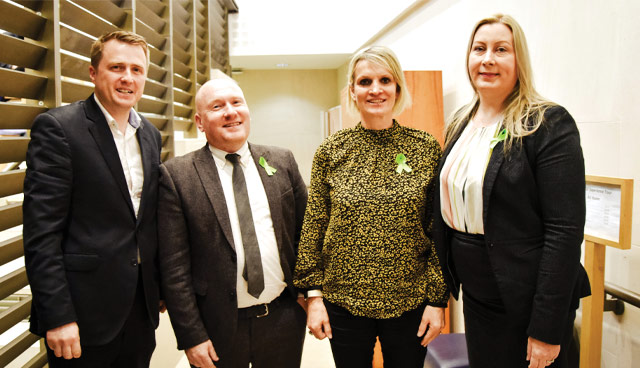Increasing mental health supports for second level school children

The Irish Association for Counselling and Psychotherapy (IACP), the largest representative body for counselling and psychotherapy in Ireland, is seeking a commitment from the Government that effective and timely therapeutic interventions will be made available so that vulnerable second level school children across Ireland can get the help they need, when they need it. Lisa Molloy, Chief Executive of the IACP, writes.
 Irish children and adolescents are experiencing mental health issues at an alarmingly high rate. A Royal College of Surgeons Ireland (RCSI) study reveals that by the age of 13, one in three Irish children will experience a mental health difficulty (Cannon et al 2013). Demand for support is rising for issues such as anxiety, self-harm and suicidal ideation (Irish Times April 2019). The suicide rate amongst Irish teenagers is the fourth highest in Europe (UNICEF Report Card 2017).
Irish children and adolescents are experiencing mental health issues at an alarmingly high rate. A Royal College of Surgeons Ireland (RCSI) study reveals that by the age of 13, one in three Irish children will experience a mental health difficulty (Cannon et al 2013). Demand for support is rising for issues such as anxiety, self-harm and suicidal ideation (Irish Times April 2019). The suicide rate amongst Irish teenagers is the fourth highest in Europe (UNICEF Report Card 2017).
The World Health Organisation (WHO) tells us that school is one of the most important places for promoting mental health and that schools are best placed to identify children who are experiencing emotional distress. While the Irish Government has been committed to developing programmes to strengthen young peoples’ coping skills and improve overall mental health and wellbeing there is, nonetheless, a lack of enough access to therapeutic supports for second level school children who may be experiencing mental health difficulties.
Evidence shows that a range of psychological interventions, including counselling and psychotherapy, are effective in the prevention of suicide and self-harm, and that timely access to them is crucial. We know that access to these therapies remains a significant challenge in Ireland, particularly access to the Health Service Executive (HSE) Child and Adolescent Mental Health Services (CAMHS).
The IACP proposes that second level school children would benefit from the introduction of an ‘on-call’ therapeutic counselling service, additional to existing arrangements. This service would complement and support the invaluable work already being carried out by principals, guidance counsellors, teachers and other professionals in our second level schools. It can also help to fill the identified gap in onward referrals from schools, where children are generally experiencing lengthy delays in accessing external and state services. The introduction of a funded ‘on-call’ support service connected to the school would enable access to essential mental health supports in a timely and seamless manner.
UK Experience with school counselling
School-based counselling is well established across the UK and has been proven to work and to be cost-effective. The cost of six school-based therapeutic counselling sessions in the UK, is estimated to be one tenth of the cost of a referral to a community CAMHS (child and adolescent mental health services) service. The UK Department of Health estimate that a targeted therapeutic intervention delivered in a school costs about £229 but derives an average lifetime benefit of £7,252. This represents a cost benefit ratio of 32-1. In Wales, 85 per cent of those who availed of school-based counselling did not require onward referral to CAMHS.
An evaluation carried out for the Welsh Government – assessing the first three years of its school-based therapeutic counselling strategy – indicates that school-based counselling is associated with ‘large and significant reductions in psychological distress’ and that it is ‘consistently rated positively by a range of stakeholder groups and viewed as a non-stigmatising, easily accessible form of early intervention’.
The provision of counselling to school children is a cost-effective, easily accessible, early intervention, which offers professional support for vulnerable children, and adolescents, who are experiencing mental health issues/emotional distress. The IACP advocates that counselling and psychotherapy supports should form part of a holistic approach to the promotion of wellbeing amongst children and young people in Ireland.
Call to build on commitment to wellbeing in schools
The IACP is calling for Government to build on the commitment outlined in the ‘Wellbeing Policy Statement and Framework for Practice 2018-2023’. This framework states that ‘all schools and centres for education will provide evidence-informed approaches and support, appropriate to need, to promote the wellbeing of all their children and young people’. The IACP’s proposal for development of an ‘on-call’ therapeutic counselling service for second level school children is very much in line with this objective.
A nationally representative General Public Survey commissioned by the IACP and carried out by Behaviour and Attitudes (2019) finds that 88 per cent of Irish adults strongly support therapeutic counselling services to be made widely available for children and young people in all Irish schools. The need has been identified and the support is palpable, so the next step is to make this a reality.
In this regard the IACP is seeking government support for a feasibility study to be carried out in a number of secondary schools to determine how best to establish this necessary service.
The foremost hope of the IACP is that any child attending secondary school will be able to access the help they need, when they need it.
About the IACP:
Established in 1981, the IACP identifies, develops and maintains professional standards of excellence in counselling and psychotherapy through education, training and accreditation. We promote best practice and the professional development of our members and hold at our core the protection of the public. We represent both the interests of clients and our more than 4,200 members nationwide. If you’re seeking a counsellor/psychotherapist in your area, call 01 230 3536 or logon to iacp.ie today to view our online directory with details of counsellors/psychotherapists in your area.
T: 01 230 3536
E: ceo@iacp.ie
W: www.iacp.ie





